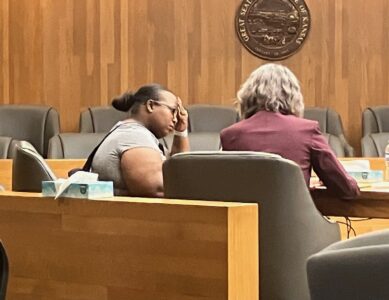Case highlights vicious cycle of domestic abuse
Nearly five years ago, Linda Begay told police that her boyfriend, Christopher Belone, had grabbed her outside their trailer, choked her, punched her, kicked her and told her, “I am going to kill you.”
But Belone was never convicted of domestic battery in that case. The day before it was scheduled to go to trial, prosecutors in then-Dist. Atty. Christine Kenney’s office dismissed it, leaving a note in the court file: “Victim uncooperative and unable to be located.”
In June 2003, Belone was again charged with beating Begay, but prosecutors encountered similar troubles, although Belone was convicted on a related charge of battering a police officer.
Now, Belone stands accused of murdering Begay at Gaslight Village mobile-home park, 1900 W. 31st St., by punching her and beating her with a wooden object – the third domestic violence death in the Lawrence area in the past three years. Begay died Aug. 1 at a Topeka hospital, three days after the beating occurred.
Both Mary Miller, who died in 2004, and Carmin Ross, who died in 2003, were killed by a husband or ex-husband. But in those cases, unlike in Begay’s, there was no known history of physical abuse.
Domestic violence by the numbers
¢ In 2005, there were 146 domestic-battery criminal cases filed in Douglas County District Court – 136 misdemeanors and 10 felonies.
¢ Domestic battery is a misdemeanor on the first and second offense, but it becomes a felony on the third offense within five years. Upon a third or subsequent conviction within five years, the person must be sentenced to at least 90 days’ imprisonment, but can be placed in a daytime work-release program after 48 consecutive hours behind bars.
¢ According to a statewide Kansas Bureau of Investigation study in 2002, in most domestic-violence cases the victim is either the child of a boyfriend or girlfriend (30.4 percent) or the spouse (21.5 percent).
¢ Detailed statistics were not available Monday on the number of domestic-violence arrests made each year by Lawrence Police, but in 2002 there were 154 arrests in Lawrence, according to the KBI.
¢ Help is available in Lawrence through Women’s Transitional Care Services, 843-3333 or 1-800-770-3030.
Begay’s prolonged involvement in her relationship with Belone, despite the repeated arrests, shows that there’s only so much the system can do to stop domestic violence.
“They get mad. They argue with each other. They call the police. Police respond, and in the interim, they make up and they’re back together. That’s really the challenge of these kinds of cases,” said Greg Robinson, a former Lawrence Police officer who is now Belone’s court-appointed defense attorney.
Hard to get out
According to Women’s Transitional Care Services, a local agency that serves battered women, it takes an average of seven incidents for a woman to leave an abusive relationship. Elyse Towey, a court advocate for the agency, said a common misperception is that women don’t get out of an abusive relationship in part because they thrive on the abuse.
“There may be kids involved. There may be financial reasons,” Towey said. “They may feel that they don’t have any other place to go or any way to get out of it.”
Begay, 37, and Belone, 35, have a kindergarten-age son, who was taken into state custody after Begay’s death. On Monday, Belone appeared before Judge Jack Murphy and was charged with intentional second-degree murder, as well as violating a court order not to go near Begay – an order that stemmed from a battery case in June that was still pending at the time of Begay’s death.
Murphy set Belone’s bond at $300,000.
According to court records, Belone often lashed out physically when he was drunk, and he had undergone court-ordered substance-abuse treatment. Dreama Biggers, an acquaintance of the couple, said that although she didn’t witness the July 29 beating incident, she’d seen Belone punch Begay in the past – and vice versa.
“Nobody would get through to her that she can’t raise a child the way she was doing it,” Biggers said.
Law enforcement policies
One dynamic that affects domestic battery cases is that, under Kansas law, police must arrest someone if they come to a home and find probable cause that a battery between household members has occurred – even so much as a shove, or a door slammed on someone’s foot.
“The emotional state of those involved, socioeconomic impact, effect on the mental status of the children, long-term effects on the family or the wishes of the victim are not to be considered in making the decision to arrest,” the Lawrence Police Department’s policies state.
As a result, prosecutors often end up with victims who are reluctant to testify. In two domestic violence cases this year, Dist. Atty. Charles Branson’s office has asked a judge for an “in-custody subpoena,” in which the victim is arrested and brought before a judge to post bond as a way to ensure future court appearances.
In his 2004 campaign, Branson criticized then-incumbent Kenney for using that same power, saying that domestic violence victims are afraid of the system and “forced to testify when they do not want to.” He said he still believes the subpoenas were being used improperly when Kenney was in office as a way to force victims to either testify or stop calling the police.
Now, he said, they are used “very rarely and only when we believe someone is in danger.”







